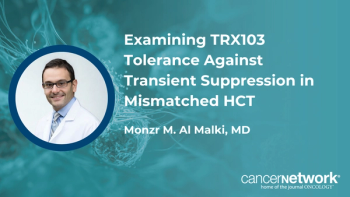
Combined HDAC, mTOR Inhibition Shows Clinical Efficacy in Relapsed/Refractory Hodgkin Lymphoma
This phase 1 study found that vorinostat (Zolinza) in combination with either sirolimus (Rapamune) or everolimus (Afinitor) demonstrated clinical efficacy in patients with relapsed and/or refractory Hodgkin lymphoma and warrants further investigation.
The histone deacetylase (HDAC) inhibitor vorinostat (Zolinza) in combination with the mTOR inhibitor sirolimus (Rapamune) or everolimus (Afinitor) demonstrated clinical efficacy in patients with relapsed and/or refractory Hodgkin lymphoma and warrants further investigation, according to results from a phase 1 clinical trial published in Clinical Cancer Research.1
“In our study, we observed a relatively high objective response rate in a patient population that would otherwise have poor outcomes,” Filip Janku, MD, PhD, an associate professor at The University of Texas MD Anderson Cancer Center, said in a press release.2 “Based on our results, I believe further investigation is warranted for these combination treatments.”
During the dose-escalation portion of the study (NCT01087554) with vorinostat and sirolimus, a patient with Hodgkin lymphoma refractory to 9 prior therapies demonstrated a partial response (PR) which lasted for 18.5 months, promoting additional enrollment of patients with Hodgkin lymphoma as well as exploration of an alternative combination of vorinostat and everolimus.
In the nonrandomized, open-label, dose-escalation phase 1 study, a total of 40 patients with refractory Hodgkin lymphoma received vorinostat plus sirolimus (n = 22) or vorinostat plus everolimus (n = 18). Patients had received a median of 5 prior therapies, including brentuximab (Adcetris; n = 39), autologous stem cell transplantation (n = 26), and allogeneic stem cell transplantation (n = 12).
Complete response was reported in 6 (27%) patients treated with vorinostat plus sirolimus and 2 (11%) patients treated with vorinostat plus everolimus. Moreover, PR was reported in 6 patients (27%) treated with vorinostat plus sirolimus and 4 (22%) patients treated with vorinostat plus everolimus. The objective response rates were 55% and 33%, respectively.
Regarding safety, the most frequent grade 3 or greater treatment-related adverse event was thrombocytopenia in 55% and 67% of patients treated with vorinostat plus sirolimus and vorinostat plus everolimus, respectively.
“Responses appeared to be more frequent in patients who received vorinostat and sirolimus; however, small numbers and absence of randomization precludes definitive conclusions,” the authors noted. “Of note, responses were seen even in patients who received prior treatment with AKT or HDAC inhibitors.”
Importantly, none of the patients enrolled in this study received prior PD-1 inhibitors, and it remains unclear as to whether the same salutary activity can be achieved in a post—PD-1 inhibitor setting. Further, while patients treated with vorinostat and sirolimus received the recommended phase 2 dose, patients treated on the dose-escalation study with vorinostat and everolimus were treated with everolimus doses from 5 mg to 10 mg daily, which could have impacted the efficacy observed in this trial.
Moving forward, Janku noted that future research will evaluate the efficacy of the current study combinations with immune checkpoint inhibition.
“There is evidence that both mTOR and HDAC inhibitors affect the tumor microenvironment, so there may be a benefit to combining these inhibitors with immunotherapy,” Janku explained.
References:
1. Janku F, Park H, Call SG, et al. Safety and Efficacy of Vorinostat Plus Sirolimus or Everolimus in Patients with Relapsed Refractory Hodgkin Lymphoma. Clinical Cancer Research. doi: 10.1158/1078-0432.CCR-20-1215
2. Combined Inhibition of HDAC and mTOR May Improve Outcomes in Patients with Relapsed/Refractory Hodgkin Lymphoma [news release]. Published October 14, 2020. Accessed October 14, 2020.
Newsletter
Stay up to date on recent advances in the multidisciplinary approach to cancer.










































